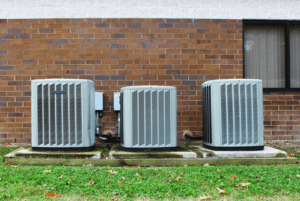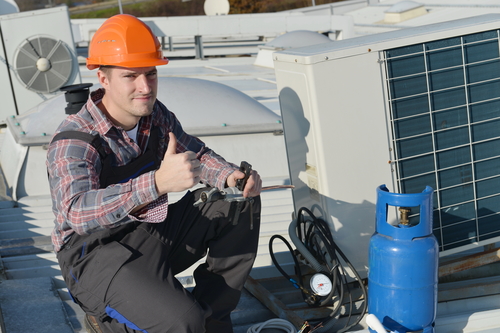In any commercial setting, a working HVAC system is crucial for keeping your business running as usual. Whether you run a restaurant, a hotel, a retail shop, a movie theater, an office building, or a commercial shipping warehouse, you need to have functional heating, cooling, and ventilation. Your HVAC system is vital for maintaining a comfortable environment in your building, for maintaining employee morale and customer satisfaction, for preventing winter pipe freezes and other types of damage, for keeping a high standard of air quality, and much, much more. Put simply; your HVAC system is the beating heart of your building. This blog post will provide a brief but detailed “commercial HVAC systems 101,” to tell you what you need to know about buying, using, and maintaining a commercial HVAC installation.
HVAC Functions
 Let’s start by talking about the roles that HVAC plays in a commercial building. HVAC, of course, stands for “heating, ventilation, and air conditioning.” However, your HVAC system also goes beyond these basic named functions. For instance, beyond heating and cooling, it’s also responsible for controlling the humidity level in your building. It’s responsible for filtering air and circulating exhaust out of your building. It’s responsible for facilitating air movement and flow throughout your entire facility. These functions are all important for maintaining a comfortable, healthy, temperate, and fresh environment in your building. If one part of your HVAC system is not working as it should, you lose this balance in immediately noticeable and detrimental ways.
Let’s start by talking about the roles that HVAC plays in a commercial building. HVAC, of course, stands for “heating, ventilation, and air conditioning.” However, your HVAC system also goes beyond these basic named functions. For instance, beyond heating and cooling, it’s also responsible for controlling the humidity level in your building. It’s responsible for filtering air and circulating exhaust out of your building. It’s responsible for facilitating air movement and flow throughout your entire facility. These functions are all important for maintaining a comfortable, healthy, temperate, and fresh environment in your building. If one part of your HVAC system is not working as it should, you lose this balance in immediately noticeable and detrimental ways.
An HVAC system serves all these functions in any setting, including homes. However, because commercial buildings are often much larger than residential buildings, commercial HVAC systems need to do a comparatively massive amount of work. As a result, these systems are usually complex, substantially sized, and carefully selected.
The Most Important Part of Commercial HVAC Systems 101: Choosing the Right System
Because commercial buildings have such substantial HVAC demands, the process of choosing/designing the HVAC system for your commercial building needs to be a top priority. Whether you are constructing a new commercial facility and trying to plan for your HVAC needs or upgrading your business with a new HVAC system, consulting a professional HVAC consultant is a must.
A huge consideration is the size of the system. An undersized HVAC system will not be capable of producing enough hot or cool air to maintain a consistent temperature throughout your building. An oversized system, meanwhile, is just as problematic. When an HVAC system is too big, it’s essentially overloading a too-small space with too much hot or cold air. Immediately, this kind of issue will lead to huge problems with temperature consistency throughout your building. Parts of the building will feel too hot, and others will feel too cold. The system will also have to switch on and off frequently, rather than only switching on intermittently but running for longer bursts of time. This on-and-off operation causes faster wear and tear for your HVAC system. Your system also needs to run for longer to achieve the proper humidification or dehumidification.
Consulting with an HVAC expert will help you find the right HVAC system for your commercial building. Your HVAC consultant will consider every aspect of the building—from the square footage to the layout, all the way to other complicating factors like ceiling height—to determine how much heating and cooling you need. From there, your HVAC expert will be able to recommend an HVAC installation that suits the needs of your building. Consulting with an HVAC professional will also help you choose a system that complies with energy codes and other government regulations.
Don’t Forget about Zone Control
Another important consideration for commercial HVAC systems 101 is zoning. Especially if your building is large or has multiple floors or sections, you are probably going to have different temperature needs in different parts of the building. For example, the people working in the office might want the temperature at 72 degrees, while the guys on the loading dock might like it closer to 65. These temperatures are going to be maintained by the same HVAC system. Offering zone temperature control with your HVAC system will ensure that everyone is as comfortable as possible.
Call for Help with Your Commercial HVAC System Today
Finally, don’t forget that maintenance matters for your HVAC system. Having an expert out on a semi-regular basis to check your system and make sure it is operating efficiently is essential. Keep an eye on your business utility bills, to watch for cost spikes that might indicate a problem with your system. Have your ducts cleaned and your air filters replaced regularly, to ensure that your building’s air quality is good. Avoid system breakdowns with regular maintenance and timely repairs. All these tips will help ensure that your commercial HVAC installation stays healthy, efficient, and cost-effective.
If you are interested in even more thorough commercial HVAC systems 101, call an HVAC expert in your area today.


